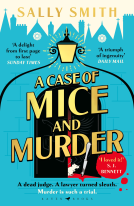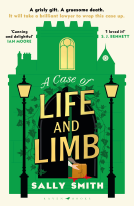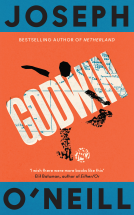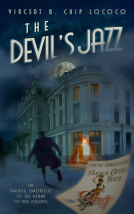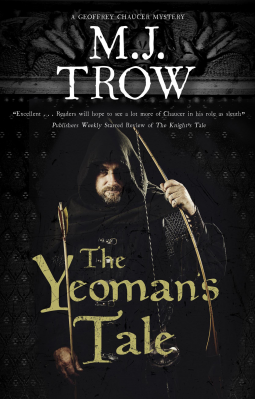
The Yeoman's Tale
by M.J. Trow
This title was previously available on NetGalley and is now archived.
Send NetGalley books directly to your Kindle or Kindle app
1
To read on a Kindle or Kindle app, please add kindle@netgalley.com as an approved email address to receive files in your Amazon account. Click here for step-by-step instructions.
2
Also find your Kindle email address within your Amazon account, and enter it here.
Pub Date 5 Jul 2022 | Archive Date 30 Jun 2022
Talking about this book? Use #TheYeomansTale #NetGalley. More hashtag tips!
Description
Poet-sleuth Geoffrey Chaucer is caught up in the chaos of the Peasants' Revolt as he attempts to track down a brutal killer.
June, 1381. Embarking on his annual pilgrimage to Canterbury, Geoffrey Chaucer and his fellow travellers are forced to turn back when confronted with a horde of armed and angry peasants, intent on marching to London. Returning to the city to warn the authorities of the approaching danger, the pilgrims hole up at the Tabard Inn and prepare for the coming invasion.
That same night, a woman's body is fished out of the River Thames, her throat cut. When he discovers that the victim was the wife of one of his fellow pilgrims, Chaucer determines to investigate. Could the woman's henpecked husband be responsible for her death? A jealous business rival? Or was she murdered by one of the pilgrims? Does a cold-hearted killer lurk within the Tabard?
As the army of rebellious peasants approaches, Chaucer finds himself in a race against time to uncover the truth before anarchy descends.
A Note From the Publisher
Available Editions
| EDITION | Other Format |
| ISBN | 9780727850683 |
| PRICE | US$28.99 (USD) |
| PAGES | 224 |
Featured Reviews
 Me'Shelle D, Reviewer
Me'Shelle D, Reviewer
June, 1381. Embarking on his annual pilgrimage to Canterbury, Geoffrey Chaucer and his fellow travellers are forced to turn back when confronted with a horde of armed and angry peasants. Returning to the city to warn the authorities of the approaching danger, the pilgrims hole up at the Tabard Inn and prepare for the coming invasion. That same night, a woman's body is fished out of the River Thames, her throat cut. he discovers that the victim was the wife of one of his fellow pilgrims, Chaucer determines to investigate. Could the woman's henpecked husband be responsible for her death? A jealous business rival? Or was she murdered by one of the pilgrims? Does a cold-hearted killer lurk within the Tabard?
Ad so the journey begins. This was the first book I read by this author and I loved it. Amazing. Can't wait for the next read
 Librarian 431790
Librarian 431790
It's a good historical fiction, well researched and compelling. The mystery takes the backseat but the story is well developed and I enjoyed it.
MJ Trow can write gripping stories and this is a good specimen.
Recommended.
Many thanks to the publisher and Netgalley for this ARC, all opinions are mine
Many thanks to NetGalley and Severn House for this Advanced Reader Copy and the opportunity to review "The Yeoman’s Tale." All opinions and comments are my own.
It’s the fourth year of Richard II’s reign. Geoffrey Chaucer is about to embark on his re-formed pilgrimage (as recounted in "The Knight’s Tale," the first book in the series) to Canterbury as "The Yeoman’s Tale" opens. Ten days he’ll be gone. He’s the Comptroller of Woollens now, so we’re told. A prestigious post.
There’s a dead woman in the Thames. Angry peasants thinking that a priest wants them to rise against “their betters.” Chaucer knows nothing of any of this. Yet. But dollars to donuts (or pennies to pottage, as someone living in 1381 England might have understood), he and we are destined to find out. M.J. Trow has a habit of doing that to his readers.
This time he gets to leave on the journey. Accompanying him are a yeoman, a priest, a miller, a prioress, a wool merchant and friend of Chaucer, and sundry others. To pass the time they start telling tales along the way. Sound familiar?
But disaster strikes almost immediately, as the group is accosted by an army of men advancing on London. There are acts of violence. And Chaucer and his group are force to return. Little do they know that they have come across what history records as the beginning of the Peasants Revolt (among other names), when a vast group of people, unhappy with what was happening in the country with the imposition of a poll tax, decided to take their grievances to the king. Things didn’t end well, of course. But that is in the future.
One of the problems, as if murder and mayhem wasn’t enough, is that the peasants have vowed to rid the country of nobles and other such persons -- persons like Chaucer. So besides trying to keep himself alive, there are bodies being discovered (remember that dead woman in the Thames)? So, while Chaucer is dodging being killed himself, and keeping a lot of others alive (with the yeoman’s help) he’s also insisting on solving these crimes. For his own peace of mind.
Eventually, of course, Chaucer figures it all out. Secrets can be held for just so long. The puzzle is solved, in a fashion that can be classified as definitely medieval.
One of the attractions of these books is the history lesson you’ll get alongside a thorough homicide investigation. And in between there is humor in these pages. M.J. Trow had to have fun writing the part whereby Master Chaucer complains that he shouldn’t be judged because he doesn’t know what a unicorn walks like. No, I’m not going to tell you the context. You’ll have to read the book for that.
 Marlene H, Reviewer
Marlene H, Reviewer
Just as in the first book in this historical mystery series featuring the very real and historical Geoffrey Chaucer as a fictional and very amateur detective (The Knight’s Tale), this year’s story begins with Chaucer setting out on his annual pilgrimage to Canterbury. The one that inspired his most famous work, The Canterbury Tales.
As Chaucer and the group of assorted pilgrims set off on their journey from London, we’re introduced to Chaucer’s fellow travelers as they start telling each other stories to pass the time. It begins to seem like we’re going to be following along as Chaucer experiences the inspiration for his Tales much more directly than he – or we – ever imagined.
But that’s where this much-anticipated and well-planned pilgrimage goes completely off the rails. Again. Last year the pilgrimage went on but Chaucer himself did not embark upon it as he was forced to remain in London due to the events of the earlier book.
This year, this spring of 1381, the entire company is forced to turn back by events that are much larger and more encompassing than anything Chaucer ever imagined in his poetry. The pilgrims on the road to Canterbury run headlong into the massed Commons of England as they march toward London and their date with doom and destiny in what history records as the Peasants’ Revolt.
They return to a city that is about to be besieged, even if none of the powers that be are willing to acknowledge that the ragtag army heading their way is any kind of a threat to the small but well-armed and well-trained militia that guards the city and especially the palace and person of the king, Richard II.
Only to find that the death they fled on the road has preceded them into London. One of the members of their party chanced upon a dead woman floating in the Thames, a not uncommon occurrence at the time. Upon discovering that the poor unfortunate had her throat expertly slit, the yeoman who found her concluded that she had been murdered and couldn’t let the matter rest. So he brought the corpse to the inn where the pilgrims were gathering – and about to be surrounded by the invading rebel army.
There’s more than one situation stinking up The Tabard Inn as the guests prepare to impatiently wait for either rescue or death. But even in the face of all the death and destruction about to overcome them, Geoffrey Chaucer can’t let this one, seemingly unrelated murder go without trying to discover whodunnit.
Escape Rating B-: The thing about historical mystery, just like other hybrid genres, is that it has to satisfy both sides of its equation in order to satisfy its readers. In this particular case, that means that the historical setting and characters need to be well-researched, fully-fleshed out, and seem at least plausible for their time and place, while the mystery still has to encompass the elements that readers expect of that genre, a crime to solve, an investigator, whether amateur or professional, and a solution that gives the reader the satisfaction of learning the motive, the means, the opportunity and the perpetrator of the crime – while seeing justice served upon that perpetrator in one way or another.
Whether historical mystery readers are going to find their reading of The Yeoman’s Tale satisfying is going to depend a great deal on whether they prefer their historical mysteries to emphasize the historical side of that blending or the mystery side.
Just as in The Knight’s Tale, while the author plays a bit fast and loose with the recorded events of history, the situation is plausible and the characters do fit very well into their time and place. But to say that the mystery part of The Yeoman’s Tale plays second fiddle to the historical tale of the Peasants’ Revolt, the sacking of London by the rebel army, and conditions in London and the (most likely fictional) siege of The Tabard Inn doesn’t go quite far enough. There’s an entire string section playing between the history and the mystery, with the mystery being the last, lonely instrument in that orchestra.
Not that the mystery doesn’t also get resolved in the end. But it just isn’t the story here, so calling this a historical mystery does not give the reader the true flavor of what they are about to read. And not that the story that is told here doesn’t have its fascinating and compelling moments. Chaucer the character is an up-close and personal witness to history in a way that the real man likely was not in this particular instance.
But the first book in this series, The Knight’s Tale, dealt with history on a much smaller scale and allowed Chaucer, as both character and amateur investigator, to take center stage. In this second outing, the events that surround the mystery are much bigger than any tale that Chaucer ever told.
The real historical events, even in this fictional perspective, take center stage in this story, pushing Chaucer, the mystery he seldom even thinks about during this crisis and pretty much everything else not just onto the margins of the stage, but frequently off the stage all together.
Consider this review “The Disappointed Reader’s Tale”. I really enjoyed The Knight’s Tale and was hoping for more, which is not what I think I got. And not that I don’t enjoy historical fiction set in the Plantagenet period, which this is, but I have to say that this is my least favorite part of that long dynasty. But I picked this up expecting a historical mystery and just was not thrilled with the story I got instead. If the series continues I’ll probably pick up the third book, but I’ll be a lot more cautious in my expectations.
 jean luc e, Librarian
jean luc e, Librarian
A masterful piece of English historical fiction and a very accomplished murder mystery from one of the best English wordsmiths at work today!
The 1381 Peasants' Revolt, also called Wat Tyler's Rebellion, is at the center of this adrenaline-fueled journey into the chaotic and violent years of Richard II's early reign.
Murderous shenanigans, political cunning and the nature of human fickleness are some of the ingredients present in this dark and violent medieval brew set at the beginning of one of the most tumultuous periods in English history.
Richly detailed, blessed with a terrific cast of exquisitely drawn characters and lots of delicious dialogues, this magnificent fictional journey into the extremely noisy and confused world of late 14th century English politics is an uproarious & boisterous delight that deserves to be enjoyed without any moderation whatsoever!
Many thanks to Severn House and Netgalley for this terrific ARC!
 Sarah-Hope P, Educator
Sarah-Hope P, Educator
M.J. Trow is one of my go-to authors when I'm in the mood for an historical mystery. She has a number of series, some of which I like better than others—and her new(ish) Geoffrey Chaucer series is my current favorite. These mysteries aren't cozy, nor are they blood-soaked. The plots have enough going on that they don't drag. Most enjoyable, they're populated by a cast of characters who are engaging and who bring with them all sorts of foibles.
I found The Yeoman's Tale particularly interesting since it's set during the peasants' uprising led by Wat Tyler and John Ball. For a brief historical moment, class-based England seemed on the verge of sweeping change—and the events of the time, even if they didn't result in sweeping change are both fascinating and unsettling. Having Geoffrey Chaucer thrown into the mix makes it all the more enjoyable.
If you're someone like me, always looking for historical mystery series with interesting settings and interesting central characters, you'll want to check out The Yeoman's Tale.
I received a free electronic review copy of this title from the publisher via NetGalley; the opinions are my own.
Readers who liked this book also liked:
Rick Riordan; Mark Oshiro
Children's Fiction, LGBTQIA, Teens & YA
Keith Martin; Konstantinos Mersinas; Guido Schmitz; Jassim Happa
Business, Leadership, Finance, Computers & Technology, Reference
Vincent B. "Chip" LoCoco
Historical Fiction, Horror, Mystery & Thrillers





